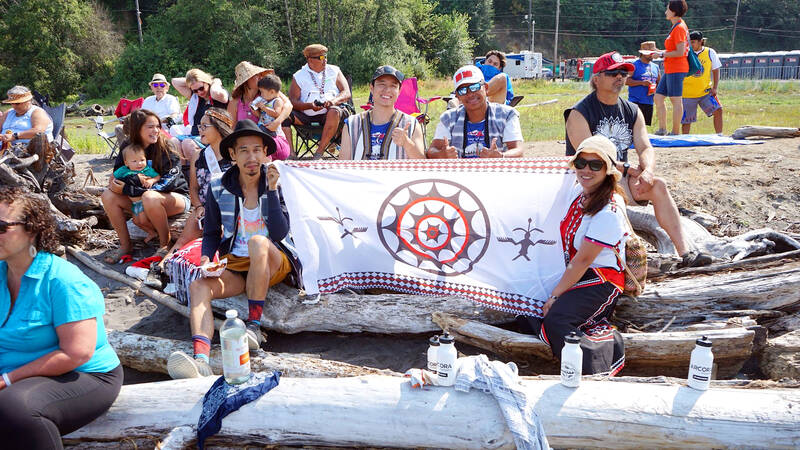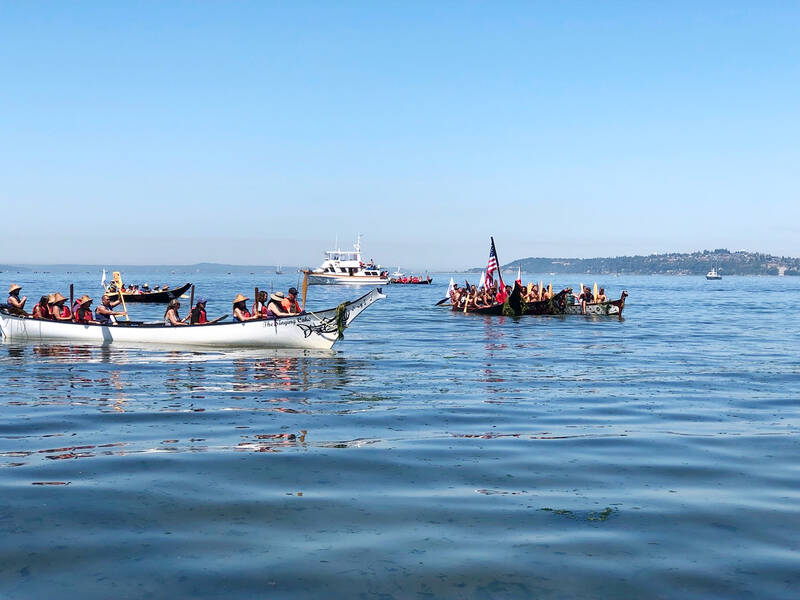Si Mateneng hasn’t paddled a canoe in a while, but he’s confident that he’ll know what to do once he gets to Washington state in the US later this month.
A member of the indigenous Tao people of Orchid Island, he grew up immersed in their maritime way of life and is excited to meet American and Canadian indigenous groups with similar traditions at the Tribal Canoe Journeys. Launched in 1989, the event now features more than 100 vessels traversing the waters between Vancouver and Seattle, ending in a different indigenous community each year. It runs from July 31 to Aug. 6 this year.
Indigenous Bridges, a nonprofit started in Taiwan to promote and preserve indigenous cultures, participated in the journey between 2017 and 2019 until the COVID-19 pandemic caused the event to be suspended for three years.

Photo courtesy of Indigenous Bridges
This year, they hope to send two youth ambassadors on the journey. Si Mateneng, a graduate student at National Chengchi University’s Department of Ethnology, is one of them.
While Si Mateneng has met indigenous youth in the US through the 2019 National UNITY Conference, this is his first time directly engaging with overseas maritime groups and participating in river and ocean-related activities.
“Most of the canoe culture I know about is in Austronesia or in the Pacific Islands,” he tells the Taipei Times. Although plans to bring a tatala (traditional Orchid Island fishing boat) to the journey didn’t pan out this year, Si Mateneng hopes that he can row one with the Nisqually tribe’s canoe family that has hosted the Taiwanese delegation every year.

Photo courtesy of Away Maya Titiyon
“I’d love to join them if I have a chance,” he says. “Maybe how they hold [the paddle] is a little different, but I’ll learn it.”
INDIGENOUS CONCERNS
More importantly to Si Mateneng, however, is exchanging ideas and experiences with fellow indigenous communities who also suffered from centuries of colonialism and are facing similar challenges of cultural erosion, discrimination and lack of educational resources.

Photo courtesy of Si Mateneng
Si Mateneng is also interested in learning about how the Tribal Canoe Journey developed into an organized, large-scale intergroup event, since it isn’t something that happens in Taiwan.
“I want to know their organizational process, how they plan, how they fundraise, how they communicate with other different groups,” he says.
Personally, he’s most concerned about the impact of tourism on Orchid Island. Everytime he goes home he notices how the environment has changed and there’s more garbage, but more alarming is how outsider tour guides continue to misrepresent his culture. Not only does this behavior affect visitors, it also slowly distorts how the Tao themselves present and practice their culture.

Photo courtesy of Indigenous Bridges
“Sometimes they’re asked questions about Tao culture that they don’t know how to answer, and to appear professional they’ll just make stuff up,” he says. “The situation hasn’t improved much over the years and we hear about it quite often, even this year.”
One solution is to mandate that tour guides go through cultural training and receive certification. He said they’ve pushed for it before, but there’s been little progress.
Si Mateneng says people should value traditional indigenous culture more especially with the government’s emphasis on sustainability. The Tao have strict rules and seasons for catching flying fish to avoid overfishing, for instance.
“Many don’t think indigenous culture is important and don’t think it helps their everyday life, but it’s connected to the goals the nation is pursuing right now,” he says.
And these ways of life need to be preserved and passed on as a whole to make sense. It’s not enough to just know what they do from a surface level, Si Mateneng says, but to fully understand why their ancestors developed such practices.
“A tatala is built completely from local materials ... but if you aren’t competent in the culture and language, it’s hard to understand why they use each material in particular,” he says. “Sustainability is built upon this knowledge, and when we try to put it into practice, it’s much easier for those who know the culture to see the reasoning behind it.”
BRIDGING PEOPLES
Away Maya Titiyon, a Saisiyat graduate of Jinshan High School’s (金山高中) indigenous art and culture program, is another Indigenous Bridges youth ambassador who may join the canoe trip. She will be studying ethnic relations at Donghwa University in the fall, and is heading to Alaska this month with her professor to take part in the World Indigenous Nations Higher Education Consortium. Since they will stop in Seattle, she’s looking to link up with the Tribal Canoe Journey.
Although Away grew up attending the Saisiyat Pasta’ay ritual and later began learning the Saisiyat language, her exposure to the culture was limited growing up in the city. She learned about the Jinshan High School program from friends she met through an indigenous speaking contest, which sparked her interest in exploring her identity more.
“It’s my dream to meet people from different ethnic groups, and I hope I can meet indigenous youth and elders and learn from them,” she says. “I’m interested in the arts, and I’d like to talk about traditional instruments, songs and crafts.”
Another issue indigenous people from Taiwan and the US can share about is racism and stereotyping. Away says it still happens to her and her friends — one time, a bus driver asked if she was indigenous, then began making jokes and called her a “savage.”
“They think it’s funny, but it’s not,” she says. “Some people think Taiwan is a really friendly place, but there’s still more to be done.”
Si Mateneng says he hasn’t experienced much overt racism, but stereotyping (love to drink, good at singing and sports) and misunderstandings are rife. He says many believe that the Tao are content with nuclear waste being stored on their island because they receive free electricity and are compensated monetarily.
“It’s because most people get their information about the situation from the government or mainstream media,” he says. “From what I see, it’s become a political issue between the two major parties … they don’t seem to truly want to deal with the problem.”
He will try to explain to those who want to listen, but ultimately it’s up to the media to change public awareness.
Gary Smoke, international relations director of Indigenous Bridges, says they developed the youth ambassador program in the past few years and aim to expand their presence to the rest of the Austronesian world.
They’ve maintained contact with their US canoe family over the pandemic, and hope to build more relations with indigenous youth groups in the Pacific Northwest this trip. Next year, they hope to bring not just a Taiwanese, but an Austronesian contingent to the journey.
Indigenous Bridges is hosting a fundraising concert for the Tribal Canoe Journey on July 9 at Master Football Academy’s Beitou VW Football Park in Taipei. Disclosure: This reporter’s band will play in the event.

Last week, the the National Immigration Agency (NIA) told the legislature that more than 10,000 naturalized Taiwanese citizens from the People’s Republic of China (PRC) risked having their citizenship revoked if they failed to provide proof that they had renounced their Chinese household registration within the next three months. Renunciation is required under the Act Governing Relations Between the People of the Taiwan Area and the Mainland Area (臺灣地區與大陸地區人民關係條例), as amended in 2004, though it was only a legal requirement after 2000. Prior to that, it had been only an administrative requirement since the Nationality Act (國籍法) was established in

Three big changes have transformed the landscape of Taiwan’s local patronage factions: Increasing Democratic Progressive Party (DPP) involvement, rising new factions and the Chinese Nationalist Party’s (KMT) significantly weakened control. GREEN FACTIONS It is said that “south of the Zhuoshui River (濁水溪), there is no blue-green divide,” meaning that from Yunlin County south there is no difference between KMT and DPP politicians. This is not always true, but there is more than a grain of truth to it. Traditionally, DPP factions are viewed as national entities, with their primary function to secure plum positions in the party and government. This is not unusual

The other day, a friend decided to playfully name our individual roles within the group: planner, emotional support, and so on. I was the fault-finder — or, as she put it, “the grumpy teenager” — who points out problems, but doesn’t suggest alternatives. She was only kidding around, but she struck at an insecurity I have: that I’m unacceptably, intolerably negative. My first instinct is to stress-test ideas for potential flaws. This critical tendency serves me well professionally, and feels true to who I am. If I don’t enjoy a film, for example, I don’t swallow my opinion. But I sometimes worry

US President Donald Trump’s bid to take back control of the Panama Canal has put his counterpart Jose Raul Mulino in a difficult position and revived fears in the Central American country that US military bases will return. After Trump vowed to reclaim the interoceanic waterway from Chinese influence, US Defense Secretary Pete Hegseth signed an agreement with the Mulino administration last week for the US to deploy troops in areas adjacent to the canal. For more than two decades, after handing over control of the strategically vital waterway to Panama in 1999 and dismantling the bases that protected it, Washington has